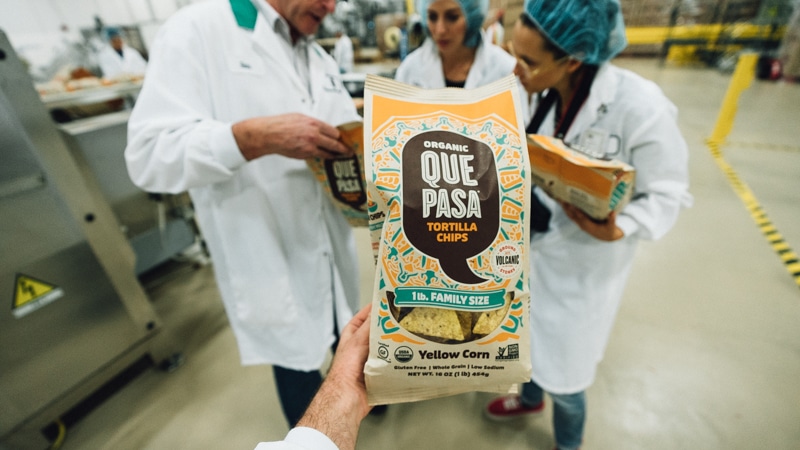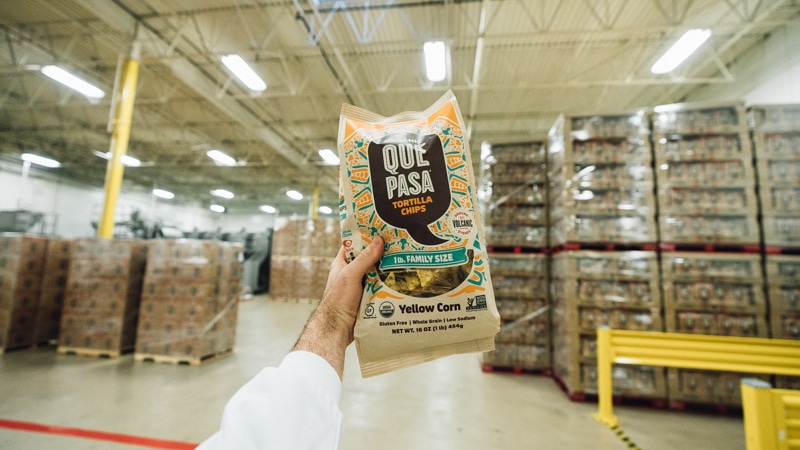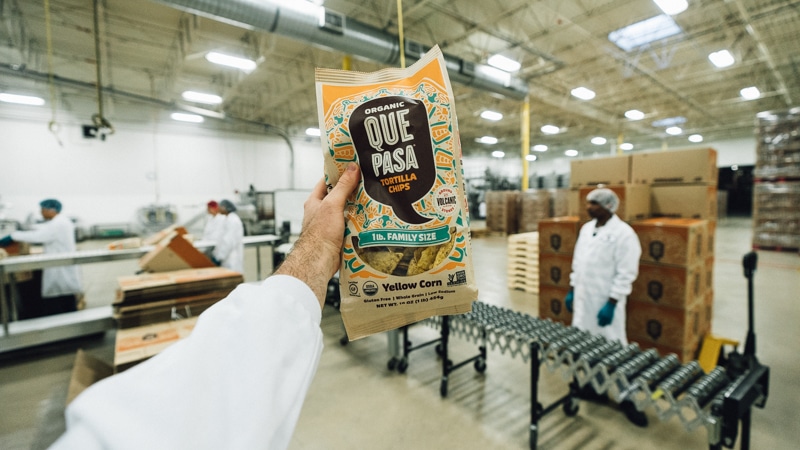Que Pasa Mexican Foods
Delta, British Columbia
March 1, 2019
- Rating System/Standard
- TRUE
- Certification Level
- Gold
- Building Type
- Industrial
Canada’s first TRUE certified project part of a journey towards becoming a zero waste company
With an overall waste diversion rate of 96 per cent, the Que Pasa Foods manufacturing facility in Delta, B.C. obtained a TRUE Gold certification in April 2016, recognizing its efforts in managing food waste and other garbage, working with suppliers and training its employees around zero waste strategies. Today, that number has increased to 97 per cent and climbing.
Adhering to the mantra, “Always leave the earth better than you found it,” tortilla chip manufacturer Que Pasa Foods and its parent organization Nature’s Path Foods (a B.C.-based company) constantly strive to reduce their environmental impact and make sustainability a priority. The achievement of Canada’s first TRUE certification underscores that corporate commitment and adds to several other accomplishments for Nature’s Path. The snack and breakfast foods maker is the first cereal company to obtain TRUE certification in Canada, the first cereal company to be Certified Organic by the U.S. Department of Agriculture, and the only company with multi-national sites that are certified.
GBCI Canada spoke with Manuel Gorrin, Sustainability and Stewardship Manager at Nature’s Path Foods, about the certification, how it fits into the company’s sustainability strategy, and the unique solutions the Que Pasa Delta facility implemented for the certification process.
Making zero waste a top corporate priority
In 2014, Nature’s Path identified being a zero-waste company as one of its six sustainability goals, along with growing organic; becoming carbon neutral by 2020; preserving water; educating, inspiring and engaging; and giving back.
The B.C. facility’s certification in April 2016 along with another TRUE Gold achievement for its Blaine, Washington location were important milestone achievements in Nature’s Path’s zero-waste journey. In April 2017, its final remaining production facility in Sussex, Wisconsin also became TRUE certified, marking the company’s successful attainment of its goal.
“The TRUE certification holds our facilities up to a high standard that helps us reduce our overall environmental impact, and we were thrilled when our facility in Delta, B.C. became the first certified facility in Canada,” says Gorrin.
Certification was a true team effort, he notes, with all 65 of the facility’s team members involved in the process under the direction of plant manager Hans Hoepfner.
Gorrin adds that TRUE provides accountability to ensure Nature’s Path is effectively managing its waste, and helps the company continue to improve its processes in order to maintain its high diversion rate. Each facility diverts more than 90 per cent of waste from landfill, amounting to a total of 2,875 short tons each year. These efforts have resulted in more than $344,000 in annual savings for Nature’s Path, meaning that this initiative makes sense for both the environment and for business.
Seeing waste generation from a different angle
Nature’s Path’s robust zero waste program isn’t just about making sure garbage isn’t sent to the landfill; rather, it represents a change in the way the company thinks about how it makes, uses and disposes of material in a responsible manner.
The company now strives to reduce waste and to turn what is left into green energy and compost. For example, they implemented process to reduce the overfilling of its corn tortilla chip bags and reducing the amount of waste generated when removing and disposing of overfilled bags.
Figuring out how to best dispose of the corn waste that comes from the production process proved challenging for the team, but they were able to devise a creative solution to ensure the food waste could be successfully diverted. The high moisture content of the corn material made it unsuitable for animal feed. Fortunately, by partnering with waste management firm Revolution Resource Recovery they were able send it for organics composting. A slight adjustment to the process line enabled the facility to eventually send some of its organic waste stream to animal feed as well as composting.
Other waste reduction strategies at the Que Pasa facility include buying corn in bulk, ensuring that suppliers use recyclable materials, training all team members in its zero waste program, and using colour-coded bins to ensure that all waste streams are being diverted appropriately.
These efforts have resulted in significant benefits for Nature’s Path, says Gorrin. “Our zero waste program allows us to see waste generation from a different angle,” he explains. “We can make changes that aid us to reduce inefficiencies, save costs, and reduce our environmental impact.”
The commitment continues long past certification
Nature’s Path continues to work on maintaining its status as a zero-waste company. It completes waste stream audits biennially at all three of its locations, a key reason it reached its zero-waste milestone. Following the audits, location-specific key performance indicators are set, as well as action plans around target waste streams identified in the audits.
The company also encourages its consumers to participate in waste diversion, and in 2017 it joined How2Recycle, a standardized labelling system that helps the consumer to properly recycle their cereal boxes and granola pouches. Company-wide waste diversion for that year continued to be strong at 92 per cent, with all the waste diverted from landfill into organic and recycling streams amounting to a total of 4,587 metric tonnes of carbon dioxide emissions, or the equivalent of reducing carbon pollution for one year from 982 passenger vehicles. As of 2018 numbers, the Delta facility had diverted 97 per cent of waste and is on track to achieve 98 per cent in 2019. These improvements were brought about by ongoing investments, which included:
- Installation of new balers for bags and liners;
- New visual tools and training for Zero Waste team members;
- Leveraged external consultants to further improve waste streams.
“We want to continue reducing the company’s environmental impact, right through to the final use of our products,” says Gorrin.


